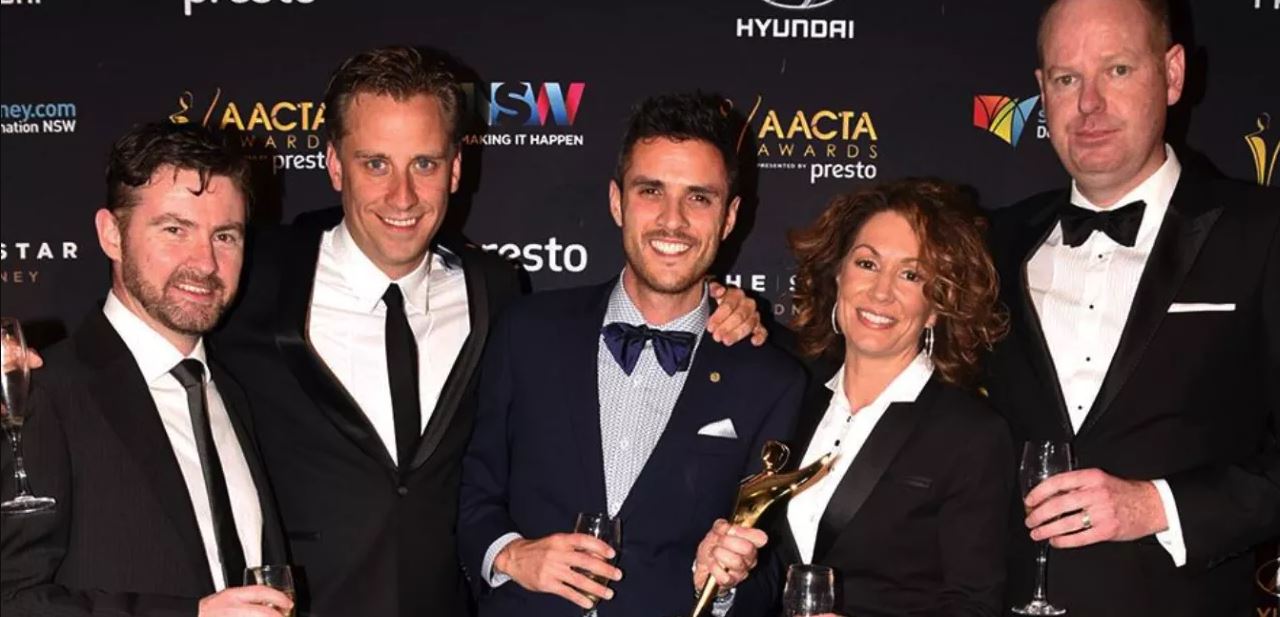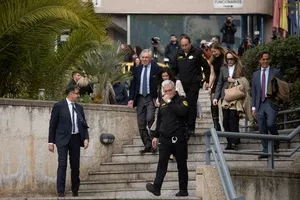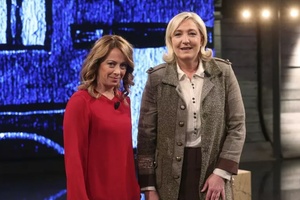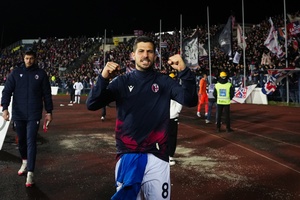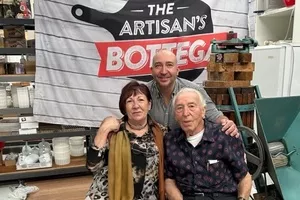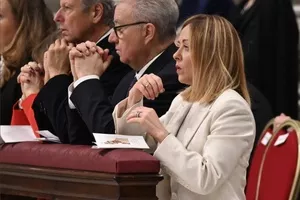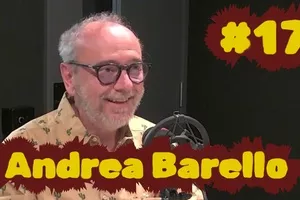His words flow softly from one to the next. He’s gracious, thoughtful. Bruzzese’s gentle nature accompanies him through his day-to-day interactions, and it is something that he takes pride in gifting to others.
If at the beginning of his career he constantly ‘cold called’ professionals in an attempt to find his place in a decidedly competitive profession, today Frank Bruzzese tries to minimise that same embarrassment for younger people – always offering to listen and extend a helping hand.
Bruzzese is an award-winning executive producer and production manager at Guesswork Television – among Australia’s top companies specialising in comedies, documentaries, entertainment programs and podcasts.
Despite his young age, he already boasts accolades for some outstanding television productions: from Masterchef Australia and Luke Nguyen’s Vietnam to the groundbreaking, Emmy Award-winning Netflix comedy special, Hannah Gadsby: Nanette. On local soil, he has won two AACTA Awards for ‘Best Light Entertainment Program’ with The Weekly with Charlie Pickering and Hamish & Andy’s Gap Year South America.
We meet at a quiet café in Collingwood, surrounded by succulents and the aroma of freshly roasted coffee. His friendliness is immediately apparent as he retraces his multifaceted childhood. He also accurately recalls daily statistics relating to the pandemic, now a matter of course for him.
“8971 new cases and five deaths have been recorded today,” he confidently declares, as he envisions his next steps in a professional field that he has chosen, and has chosen him back.
With an Italian father, originally from Grotteria, a small town in the province of Reggio Calabria, and a Spanish-Filipino mother, Bruzzese says from the outset, that he only realised he was slightly different from his peers when he started school.
He stresses that while he “never had a thick accent” like his Dad had throughout his school years, that there were still moments that made him feel like somewhat of an outsider.
“You’re there and your lunchbox smells different... people are trading lunches, but no one wants to trade with you.”
He had also always thought that his family’s tradition of an evening meal shared together was commonplace in all households, but soon realised “that just wasn’t the case for a lot of people”. “There was a beauty around the Italian culture and the Filipino food in our family that always brought us together at around 6:00p.m., which I thought was just what everyone did.”
As a child, the influence of the television of the Bel Paese, of RAI TV, quickly took hold, even in his home in Keilor where he grew up. His grandmother’s Italian soap operas, his father’s love of black and white films and his mother’s game shows became a staple of his childhood. As did the works of Alfred Hitchcock, a teenage obsession whose horrors and thrillers impacted him deeply – “probably the reason I chose this career path.”
“As I was growing up, my dad always wanted to know what I was going to do and he was always thinking that I would end up in law or forensic science. My parents did originally think that this was going to be a short-term hobby. They were worried about there being no longevity in the field, that it was inconsistent and there was no stable income”, Bruzzese recounts.
“They worried about that for maybe four or five years, then they realised that I hadn’t been out of work for that whole time, and that it was fine. I was, in fact, bringing in more money than my dad by that point.”
Bruzzese’s first job on the set of the first season of The X Factor, his early days as a runner, and then as a junior producer are almost emotional for him to recall; his boyhood dreams were coming true, working on a TV set on a Sunday, not being afraid to go forth and carve out a space for himself in an unpredictable, breakneck profession. “Magical” moments, immersed in the fascinating dynamics unique to the making of a TV series.
Since those distant days, some twenty years of long strides, obstacles overcome, surprises and trepidation have already passed. Today Bruzzese finds himself working in an industry that has certainly evolved, finally embracing the things that made him feel “different”, incorporating them into the stories he tells.
Frank Bruzzese clasps the AACTA Award, accompanied by some accomplished colleagues. Gerald McCulloch (left to right), Chris Walker, Frank Bruzzese, Kitty Flanagan and Tom Gleeson. (Photo provided)
“As a queer boy, I remember very often finding myself on set with people who were going through the same experiences as me, yet there was no representation on screen,” he adds.
“Today, however, things are exciting. Television is exploding, especially in relation to the diversity factor: space is being created for the LGBTQA+ community and for indigenous people. My minority is finally working, and I keep running into colleagues of Italian descent from the western suburbs of Melbourne, which was definitely rare in the past.”
Frank Bruzzese, however, was quickly repaid for his audacity, for the difficulties of navigating unfamiliar terrain non-stop, taking a breath only when necessary. He has collected numerous accolades in Australia; his successes culminating in his arrival in the United States to accept a coveted Emmy Award.
“I was only in Los Angeles for 72 hours, but they fly you out and they treat you very well. It was incredible: to be in a room full of people that have made shows that you love was an extraordinary experience. I remember arriving to the red carpet too early, sitting on the floor in the corner, drinking a warm beer in a plastic cup and eating popcorn, the only snack available. It gave me a new perspective on the image of Hollywood!”, he says, laughing.
“It doesn’t matter what award you are nominated for or what statue you win, you’re always going to feel like you want to achieve something else. The Emmy Awards were that for me; I let go of that almost desperate ambition of my early years as a producer.”
At a complicated time in history, in the midst of a pandemic, cinema and television have undeniably acted as a lifeboat for many, an opportunity to immerse themselves in more pleasant on screen worlds amid a grey fog of worldwide unrest and uncertainty.
And while film industry professionals have juggled the precautions of COVID Marshals and ever-changing restrictions, Bruzzese decided to take another unexpected turn, starting a university course in criminology and criminal justice at Griffith University, returning to his first passion as a boy, when he lost himself in the images of Hitchcock’s masterpieces.
“I like the idea that I could hypothetically change careers in five or six years, do something different. A lot of people don’t really survive the industry, a bunch of people realise that it’s not for them. The instability of the work is a real sticking point for people. As you get older you want to start having a bit more stability in your life or buy a house, but the industry doesn’t always lend itself to that. So, I don’t think a future change is necessarily too difficult to achieve”, Bruzzese explains.
“At the moment, however, I don’t know what the future holds for me. I am certainly happy, and enthusiastic about the work I do. I think in a healthy way; I have lost some of my past ambition in trying to take over the world. I try, rather, to help younger people at the beginning of their careers. And although it can be annoying at times, because I don’t always have a lot of time, if someone asks me for a coffee or for professional advice on entering the industry, my answer will always be yes.”


